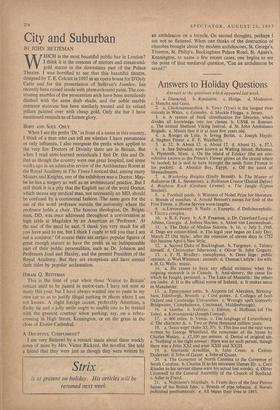Answers to Holiday Questions
Answers to the questions which appeared last week.
1. a. Diamond. b. Rosinante. c. Hodge. d, Modestine. e. Mancha and Gato.
2. a, Clackmannanshire. b. Towy (Tywi) is the longest river entirely in Wales. c. Grimsby. d. Muckle Flugga. e. Jersey.
3. a. A system of book classification for libraries, which divides all knowledge into ten classes. b. USSR in Russian.
c. The annual Shetland Viking festival d. St. John Ambulance Brigade. e. Means that it is at least five years old.
4. a. Rouget de Lisle. b. Irving Berlin. c. Joseph Haydn d. Stephen Foster. e. F. E. Weatherly.
5. a. 32. b. About 12. c. About 12. d. About 1+. e. 57.3. 6. a. San Salvador, now known as Watling Island, Bahamas.
b. Plymouth, Mass. c. On the island of Eriskay (the sea con- volvulus known as the Prince's Flower grows on the strand where he landed; he is said to have brought the seeds from France in his pocket). d. Aboukir Bay, Egypt. e. Off the coast of Massachusetts.
7. a. Wuthering Heights (Emily Brontd). b. The Master of Ballantrae (R. L. Stevenson). c. Robinson Crusoe (Daniel Defoe).
d. Brighton Rock (Graham Greene). e. The Jungle (Upton Sinclair).
8. a. Football pools. b. Winners of Nobel Prize for literature.
c. Brands of matches. d. Arnold Bennett's names for fotfr of the Five Towns. e. Home Service wave-lengths.
9. a. Ltevorotatory. b. Nadir. c. Eupeptic. d. Dolichocephalic. e. Electra complex.
10. a. R. E. Peary. b. A. P. Freeman. c. Dr. Crawford Long of Athens, Georgia. d. Joshua Slocum. e. Anton van Leeuwenhoek.
11. a. The Duke of Medina Sidonia. b. 16. c. July 5, 1948.
d. Dogs are colour-blind. e. The legal year began on Lady Day, March 25 Old Style : after the omission of eleven days in 1752 this became April 6 New Style.
12. a. Second Duke of Buckingham. b. "'urgency. c7 Tolstoy himself. d. Christopher Isherwood. e. Oliver St. John Gogarty.
13. a. F. H. Bradley: metaphysics. b. Dean Inge : public opinion. c. Walt Whitman : animals. d. Thomas Carlyle : his wife.• e. H. G. Wells : music.
14. a. He ceases to have any official existence when the reigning monarch is in Canada. b. Anti-slavery, the cause for which he fought, persisted. e. The Lake of Menteith : the others are lochs. d. It is the official name of Iceland. e. It makes sense in Manchester.
15. a. Eponymous units. b. Airports (of Aberdeen, Birming- ham, Edinburgh, Bristol). c. Card games. d. Colleges of both Oxford and Cambridge Universities. e. Wrongly spelt (correctly Bridgwater, Campbeltown, Cincinnati, Middlesbrough). 16. a. Goethe. b. Voltaire. c. Edison. d, Hoffman (of The Tales). e. Korzeniowski (Joseph Conrad).
17. a. 400 miles. b. Venus.. c. The language of Luxembourg. d. The character &. e. Two or three thousand million years. 18. a. 'Jesus wept' (John XI, 35). b. This line and the next were written by George Whitefield, the remainder of the hymn by Charles Wesley. c. £7,500 per annum. d. Denial of original sin. e. 'Nothing' is the right answer : there was no such person, though there was a John XXI and even XXII and XXIII.
19. a. Giovanni Arnolfini. b, John Cross. c. Casimir Dudevant. d. John of Gaunt. e. John of Gaunt.
20. a. The Governor of North Carolina to the Governor of South Carolina. b. Charles II to his successor (James II). c. Cecil Rhodes to his servant (these were his actual last words). d. Oliver Cromwell to the General Assembly of the Church of Scotland.
e. Adler to Freud.
21. a. Napoleon's Marshals. b. Feasts days of the four Patron Saints of the British Isles. c. Brands of pipe tobacco. d. Novels published posthumously. e. All began their lives in 1893.


































 Previous page
Previous page